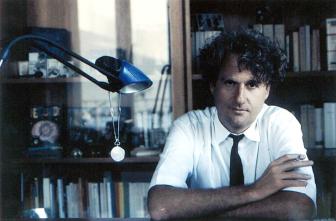Dichter
Gabriele Frasca

Gabriele Frasca
(Italië, 1957)
© Monica Biancardi
Biografie
Gabriele Frasca is a versatile artist: poet, novelist, playwright and translator. He was born in Naples.
Frasca’s language resembles an organism which develops through syntactic concatenations, overlapping of sentences, sounds (inner rhymes, echoes, assonance, word-plays, alliterations), and a skillful use of the rhythm deriving from a mastery of poetical forms. As a matter of fact, Frasca mostly writes traditional forms: sonnets, quatrains, sestinas (of which Frasca is recognized as one of the most refined contemporary Italian craftsmen).
One should not think, however, of a sublime and archaic style: his language is direct and colloquial. Indeed, Frasca has a talent for reviving traditional forms and for making them part of our modern experience. But in his poetry the unremitting dialectic between tradition and innovation never lapses into violent subversion. The linguistic, rhetorical and metrical elaboration of his poems achieves an incredible synthesis of a baroque overabundance of words and a strange beckettian void.
His poems look like an uninterrupted and twisting flow of lines, in which words are shaped by metre, rhythm and rhymes, making them double their meaning, or produce inner resonances that would otherwise inaudible. Form appears to be the only remaining possible identity for an “I” doomed to a physical and spiritual degradation and prey to obsessions, fixations and emotional drives, to the limit of psychosis. A sort of magmatic and resounding stream-of-consciousness, Frasca’s poetry shows a nostalgia for a lost integrity, which is unmasked and scoffed at by the author with cruel lightness.
His poetry shows a poetic accuracy of rare integrity and a technical mastery that perhaps today, at least in Italy, is unrivalled. In his highly polished lines, compression and synthesis of forms, sounds and meanings are the main stylistic principle.
© Roberto Baronti Marchiò
PublicationsPoetry
Rame (Milan, Corpo 10, 1984; II expanded edition: Genoa, Zona, 1999)
Lime (Turin, Einaudi, 1995)
Rive (Turin, Einaudi, 2001)
Novels
Il fermo volere (Milan, Corpo 10, 1987; II version, revised in 2002, in e-book: www.lettoricreativi.com
Santa Mira (Naples, Cronopio, 2001)
Il fronte interno (Rome, Luca Sossella, 2001)
Plays
Tele. Cinque tragediole seguite da due radiocomiche (Naples, Cronopio, 1998)
Essays
Cascando. Tre studi su Samuel Beckett (Naples, Liguori, 1988)
La furia della sintassi. La sestina in Italia (Naples, Bibliopolis, 1992)
La scimmia di Dio. L'emozione della guerra mediale (Genoa, Costa & Nolan, 1996)
Gedichten
Gedichten van Gabriele Frasca
Sponsors
























